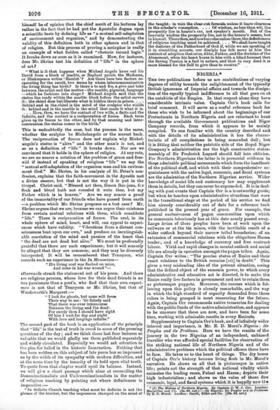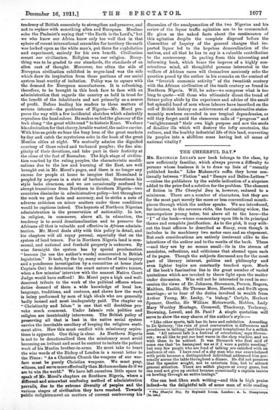NIGERIA.*
THE two publications before us are contributions of varying degrees of utility towards the enlightenment of the typically British ignorance of Imperial affairs and towards the dissipa- tion of the equally typical indifference to all that goes on at the outskirts of the Empire. In that respect alone they have considerable intrinsic value. Captain CPU'S book calls for brief comment. It will serve as a useful reference book for those who wish to be informed about the beginnings of our Protectorate in Northern Nigeria and are reluctant to hunt through the available Government publications and. Niger Company records, from which it appears to be mainly compiled. To one familiar with the country described and with the details of its administration it has the charac- teristic of all compilations in being somewhat dull ; but
it is fitting that neither the patriotic side of the Royal Niger Company's administration nor the high constructive states- manship of Sir Frederick Lugard should fall into oblivion. For Northern Nigerians the latter is in perennial evidence in thoee admirable political memoranda which form the handbook of the political staff, and which with their comprehensive ac- quaintance with the native legal, economic, and fiscal systems are the admiration of the Northern Nigerian service. Wider knowledge of social life and customary law may supplement
them in details, but they can never be superseded. It is in deal- ing with past events that Captain Orr is a trustworthy guide; but when he touches upon administrative situations that were in the transitional stage at the period of his service we find him already considerably out of date for a reference Look published in the present year of grace. For example, the general exclusiveness of pagan communities upon which he comments laboriously has at this date nearly passed away. Large levies of these peoples have been at work upon the railways or at the tin mines, with the inevitable result of a wider outlook beyond their narrow tribal boundaries; of an extension of commercial relations with the ubiquitous Hausa trader ; and of a knowledge of currency and free contract labour. Vivid and rapid changes in mental outlook and social life are already in operation amongst the pagan tribes. Again, Captain Orr writes : "The precise status of Emirs and their exact relations to the British remains [sic] in doubt." This gives a very misleading idea of the present situation, seeing that the defined object of the suzerain power, to which every administrative and educative act is directed, is to make the Emirs really live factors in government and not to retain them as picturesque puppets. Moreover, the success which is fol- lowing upon this policy is already remarkable, and the way in which the high standard of capacity demanded from these rulers is being grasped is most reassuring for the future. Again, Captain Orr recommends native treasuries for dealing with the public funds of the native administration, and appears to be unaware that these are now, and have been for some time, working with admirable results in every Emirate.
Supplementary to Captain Orr's book, and of infinitely wider interest and importance, is Mr. E. D. Morel's Nigeria : Its Peoples and its Problems. Here we have the results of the journey in the two Nigerias of an independent, unbiased traveller who was afforded special facilities for observation of the striking national life of Northern Nigeria and of the administrative problems which the political officers there have to face. He takes us to the heart of things. The dry bones of Captain Orr's history. become living flesh in Mr. Morel's narrative. He shows us all that is picturesque in native life; points out the strength of that national vitality which animates the leading races, Fulani and Hansa; depicts their high industrialism ; and shows us the value of those fine economic, legal, and fiscal systems which it is happily now the • (1) The Making of Northern Nigeria. By Captain C. W. J. Orr. London: Macmillan and Co. [88. 65. net.)—(2) Ntiletie Its Peoples and its Problem. By E. D. Morel. London : Smith, Elder and Co. EVIL 6d. net.] tendency of British suzerainty to strengthen and preserve, and not to replace with something alien and European. Muslims echo the Psalmist's saying that "the Earth is the Lord's," but we who know our Africa know only too well that in that sphere of recent international scrambles for territory the earth was looked upon as the white man's, put there for exploitation and experiment, entirely for his own benefit. Civilization meant our civilization. Religion was our religion. Every- thing was to be graded to our standards, the standards of an alien cast of thought. Moreover, too often the side of European civilization exhibited in negro-land was the side which drew its inspiration from those portions of our social system least worthy of imitation. Policy was to square with the demand for European manufactures. It is refreshing, therefore, to be brought in this book face to face with an administration that regards the country as held in trust for the benefit of the inhabitants and not primarily as a source of profit. Before leading his readers to those matters of serious interest—the problems of Nigeria—Mr. Morel pre- pares the way with a few incidental sketches which admirably reproduce the local colour. He makes us feel the glamour of the trek along "the great white road" to historic Kano. We share his admiration for that cheery, lovable wastrel, the native carrier. With him as guide we hear the busy hum of the great markets by day and catch the mysterious echo in the hush of the great Muslim cities at night. We mutually admire the dignified courtesy of those robed and turbaned peoples ; the fine sim- plicity of their devotions, and take part in their festivity at the close of the fast of Ramadan. The high stage of civiliza- tion reached by the ruling peoples, the characteristic modifi- cations due to the law and learning of the East, are well brought out in Mr. Morel's pages, and there is no longer any excuse for people at home to imagine that Hausaland is peopled by negroes in a state of barbarism. Sometimes his style lacks clearness, and we are occasionally confused by abrupt transitions from Northern to Southern Nigeria—two countries dissimilar in administrative policy—but throughout the work we get facts and accuracy, and to strike a note of adverse criticism on minor matters under these conditions would be captious indeed. The keynote of Northern Nigerian administration is the preservation of nationality. In law, in religion, in commerce, above all, in education, the tendency is to avoid denationalization and to preserve for Africans all that is valuable and effective in African adminis- tration. Mr. Morel deals ably with this policy in detail, and his chapters will all repay perusal, especially that on the system of land tenure. For in Northern Nigeria land is com- munal, and national and freehold property is unknown. By wise foresight the system has by special proclamation "become [to use the author's words] consecrated in British legislation." It took, by the by, many months of local inquiry and a ponderous investigation by a committee at home (tests Captain Orr) to determine the exact nature of native tenure, when a few minutes' interview with the nearest Native Court Judge would have sufficed ! Mr. Morel pays a high and well. deserved tribute to the work of the political officers whose duties demand of them a wide knowledge of local law, language, traditions, and customs, and shows how the work is being performed by men of high ideals who are generally badly housed and most inadequately paid. The chapter on "Christianity and Islam" is one that will doubtless pro- voke much comment. Under Islamic rule politics and religion are inextricably interwoven. The British policy of preserving all that is best in the native social system carries the inevitable corollary of keeping the religions senti- ment alive. How this must conflict with missionary aspira- tions is apparent. One thing is clear. As Northern Nigeria is not to be denationalized then the missionary must avoid becoming an irritant and must be content to imitate the patient work of his Muslim brother-in-arms. He must take to heart the wise words of the Bishop of London in a recent letter to the Times: "As a Christian Church the weapons of our war- fare must be purely Christian weapons. We must pray, witness, and serve more effectually than Mohammedans do if we are to win the world." We have left ourselves little space to speak of Mr. Morel's chapters on Southern Nigeria, where a different and somewhat confusing method of administration prevails, due to the extreme diversity of peoples and the various stages of civilization they have reached. Towards public enlightenment on matters of current controversy his
discussion of the amalgamation of the two Nigerias and his review of the liquor traffic agitation are to be commended. He gives us the naked facts about the continuance of this agitation despite the complete disproof before the Committee of Inquiry of the general charges that im- ported liquor led to the hopeless demoralization of the natives, and all that be has to say is a valuable contribution to the controversy. In patting from this interesting and informing book, which bears the impress of a highly con- scientious mind, all thoughtful persons interested in the welfare of African races will themselves anxiously echo the question posed by the author in his remarks on the contact of the "feverish economic activity" of the twentieth century with the African civilization of the tenth century as found in Northern Nigeria. Will, he asks—we compress what is too long to quote—will those who ultimately direct the trend of future policy abide by the experience and advice of the small but splendid band of men whose labours have inscribed on the roll of British history an achievement of constructive states- manship nowhere exceeded in our tropical dependencies, or will they forget amid the clamorous calls of "progress" and "enlightenment" their own high purpose and sow the seeds of deadlier ills which will destroy the lofty courtesies, the culture, and the healthy industrial life of this land, converting its peoples into a shiftless mass having lost all sense of national vitality ?



















































 Previous page
Previous page